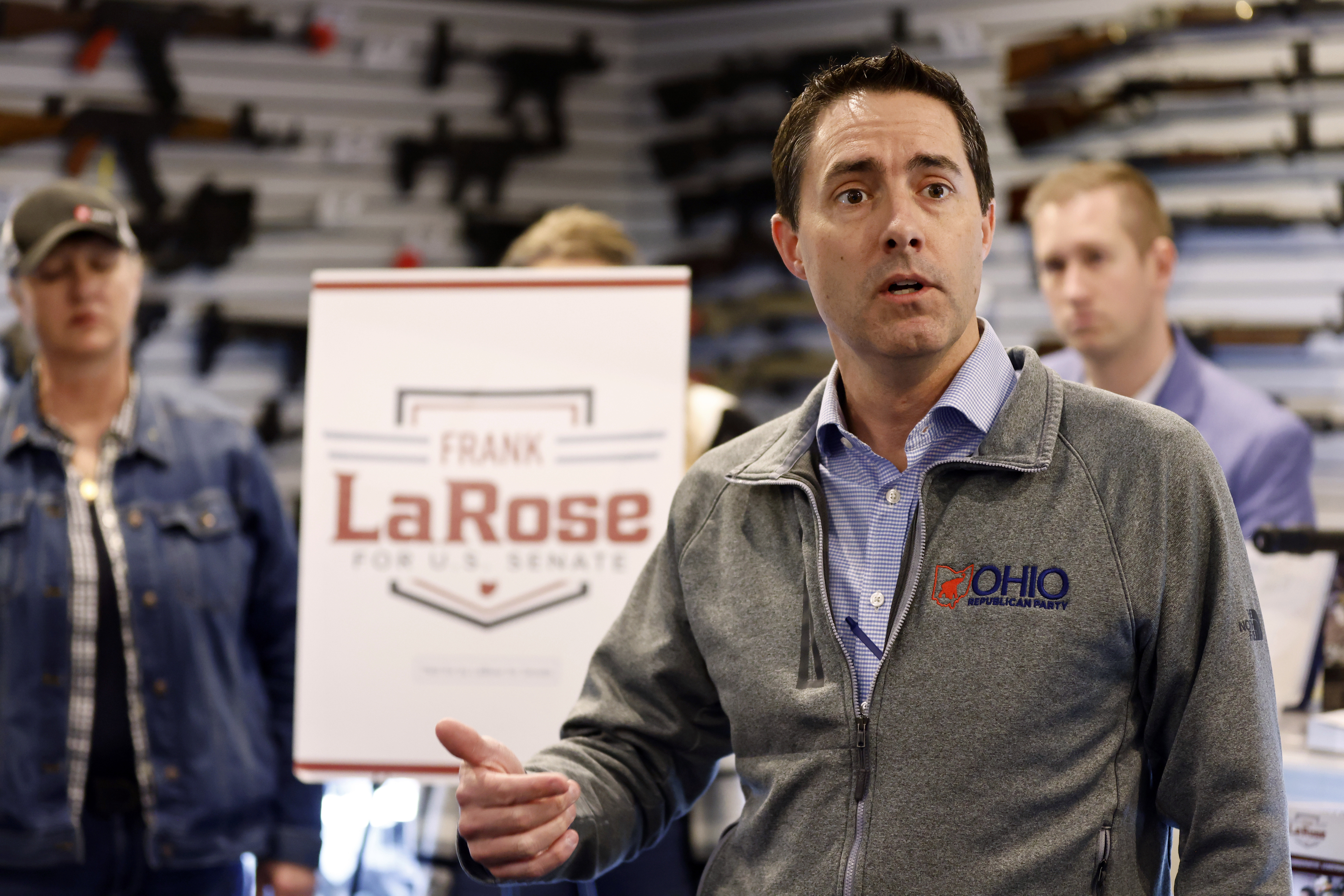SALEM, Ohio — When Donald Trump’s team invited Ohio Secretary of State Frank LaRose last summer to a gathering of Republican elected officials at the former president’s Bedminster golf club, it was a big moment for the Senate hopeful.
But it came with a condition — LaRose would have to endorse Trump’s presidential comeback bid, according to two people with knowledge of the conversation.
LaRose had just told POLITICO two weeks earlier that he did not plan to back a presidential candidate any time soon. But then he did, just hours before the dinner.
His forced endorsement of Trump wasn’t reciprocated. The former president instead backed another candidate in Ohio’s GOP Senate primary. And LaRose’s sudden reversal became one in a series of flip-flops that ended with a distant third-place finish in Tuesday’s primary to face Democratic Sen. Sherrod Brown.
It was a dramatic fall from public favor for a man who had won reelection to his state post less than two years ago. LaRose had started the three-way race with a commanding polling lead and priceless name ID as a well-liked secretary of state.
But with his future on the line, LaRose moved away from his past reputation as a pragmatic establishment conservative and tried to push into an occupied MAGA lane. He ultimately ended up with little support from either faction.
On Tuesday, his attempt at higher office flamed out, ending with less than 17 percent of the vote. He was behind both the victor who ultimately won Trump’s coveted endorsement, Bernie Moreno, and the Trump skeptic who won over the state GOP’s old guard, state Sen. Matt Dolan.
But LaRose won’t disappear from the public eye. He has nearly three years left in his term as secretary of state — a lifetime in politics. What he learns from the Senate run and how he positions himself in that time, especially during the spotlight of the 2024 election he’ll oversee, will help determine his political future.
For now, the implosion of LaRose’s campaign holds lessons for other Republicans trying to keep up with a fast-evolving party dominated by Trumpism. As the Ohio Senate race turned into a proxy warbetween the MAGA movement and the old school GOP trying to claw its way back into power, LaRose first appeared to try to straddle the lines. Then he made a play for the MAGA crowd.
He got trounced.
“LaRose kind of wanted to have it both ways,” said Rep. Warren Davidson (R-Ohio), a conservative congressmember who considered a Senate run himself but ultimately endorsed Moreno.
A spokesperson disputed that LaRose had changed, saying he’d always been a strong supporter of Trump.
“An Ohio Republican that stands with President Trump on his policies,” LaRose told reporters when asked about his ideological alignment in the final days of the race. But he shrugged off labels: “There’s no box that you can necessarily put me in.”
All three candidates in the race to face Brown have at times seemed wary of Trump. Dolan remained consistent in his assertion that Trump did not win the 2020 election and bore blame for the events of Jan. 6, 2021. He was the only one of the three to not seek Trump’s endorsement.
Moreno had also been critical of Trump, both before his 2016 election and in the aftermath of Jan. 6. But he pivoted hard to embrace Trump, especially during his 2022 Senate run, which he ended after meeting with the former president and endorsing now-Sen. J.D. Vance. Both Moreno and Vance shirked their past Trump criticisms to go all-in on supporting the former president.
LaRose’s relationship with Trump has also evolved over time.
In 2019 he called a Trump tweet “racist”. As Ohio’s chief elections official, LaRose insisted the state’s 2020 elections were fair and accurate, that there was no evidence of widespread fraud in mail voting, and any Republican who suggested otherwise was “irresponsible.”
But in seeking reelection in 2022 with a primary challenge from the right, he accepted Trump’s endorsement — and his language about the 2020 election began to shift. By February 2022, he said “President Trump is right to say voter fraud is a serious problem.”
LaRose easily won reelection in 2022. Fresh off that success, he entered the Senate race in July 2023 as the early frontrunner, starting off with a large lead over both Dolan and Moreno, who were already in the race. Even Moreno’s own internal polling from March 2023 showed LaRose with a 17-point lead over Moreno.
LaRose’s team, in fact, was so confident that in the summer of 2023, one of his consultants approached Moreno’s campaign with a proposal: Drop out and LaRose would endorse Moreno for another office. Moreno’s team declined, according to two people familiar with the call from LaRose’s consultant.
LaRose, meanwhile, was raising money as he became a major backer of a constitutional amendment that effectively served as a stand in for an abortion referendum that would be placed on the ballot that fall.
That vote failed badly. Meanwhile, Moreno was maneuvering to block LaRose from drawing MAGA support while also preventing him from pulling in help from the GOP establishment that was coalescing behind Dolan.
Both Moreno and Dolan are wealthy, but LaRose needed funds. Moreno’s campaign reached out to wealthy donors in GOP big-money circles — the kind who give to Americans for Prosperity and American Opportunity Alliance — to show them data on LaRose’s lack of a path forward, urging them to at least stay neutral in the race if they didn’t want to back Moreno, according to two people familiar with the conversations.
And as LaRose embraced the MAGA movement, some former donors moved to support Dolan instead. Jimmy and Dee Haslam, the owners of the Cleveland Browns and major GOP donors, publicly backed Dolan in a letter that praised him for not “catering to the extreme.”
They had donated to LaRose in the past but now began working to drum up support for Dolan from other major donors. By the end of the campaign, LaRose had so little money that he never aired a single TV ad.
Moreno’s team pounced on any opening to cast LaRose as anti-Trump as both candidates jockeyed for the former president’s endorsement.
When LaRose appeared to defend former Vice President Mike Pence’s actions on Jan. 6, Moreno’s allies immediately brought it to the attention of Trump’s orbit. LaRose quickly walked his comments back via a spokesperson. When old tweets from LaRose’s communications aide insulting Trump surfaced, LaRose abruptly fired the man. The aide was well-liked in Ohio GOP circles, and his ouster drew quick rebuke — and helped further sever LaRose’s ties to the establishment.
By the time LaRose officially entered the race, he had sent mixed messages about whether he would endorse Trump in the presidential primary — or whether a reciprocal endorsement would even matter.
LaRose had declined to endorse anyone in 2020, saying it was inappropriate for the state’s top elections official to do so.
In the spring of 2023, LaRose was caught on tape telling a group of Ohio Republicans behind closed doors that the Trump endorsement carries less weight than it once did and that there is “60 percent of the party that doesn’t care who he endorses.”
In an interview shortly before his mid-July launch, LaRose told POLITICO he wanted the Trump endorsement but wouldn’t beg for it, and that he wasn’t ready to endorse the president himself.
“There’s an Ohioan running for president, too,” he said, referring to Vivek Ramaswamy. “I want to hear what Vivek has to say some more and see how he does. We’ll see and time will pass and I’ll make a decision about who I’m going to endorse at a later date.”
Then came the Trump dinner. LaRose endorsed the former president just hours before the event in New Jersey.
But he got nothing in return. Trump endorsed Moreno in December, and the three-way race quickly became a showdown between Moreno and Dolan.
“Dolan clearly had the moderate lane and Bernie had a pretty good lock on the conservative Trump lane,” said Davidson, the Ohio congressmember. “And, you know, there really isn’t a third way that has a lot of momentum right now.”
By the time Trump came to rally for Moreno in the closing days of the race, LaRose had become an afterthought. Trump devoted parts of his 90-minute speech to ripping Dolan — and did not mention LaRose once.
Yet few Republicans expect LaRose to fade into obscurity.
He still has most of his second term as the state’s chief elections official ahead of him. Trump hadn’t attacked LaRose during the election, noted LaRose’s spokesperson, Rick Gorka, which “shows that there’s a respect for Frank.” And running the 2024 election will give him an opportunity to remain visible.
“He’s a young man, so I’m sure we’ll see him again in some statewide race,” Rep. Dave Joyce (R-Ohio) said.
And if LaRose was sending mixed signals before about the power of Trumpism, he is not now. On Thursday, he endorsed Moreno’s Senate bid, drawing praise from Moreno who called him “a good conservative.” It was the typical course of action for a defeated primary candidate, but it earned him kudos from the party.
“Frank LaRose is a good man, a talented politician, and has a bright future in Republican politics,” said Sen. Steve Daines (R-Mont.), who chairs the Senate campaign arm. “The reality is, President Trump’s endorsement is the most powerful force in politics.”
Zach Montellaro contributed.











